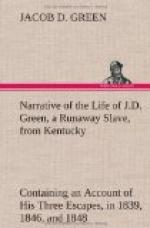peculiar kind of Christianity, and shaped to offend
as little as possible the prejudices of British readers.
And what does it show us? Does it show us that
emancipation is more likely to follow from the success
of the Southern society which assumes to be at the
helm of all schemes of religion and philanthropy, not
only has no desire to put an end to slavery, but regards
it in such a light that it will be its duty to
extend it as much as possible. The Southern
clergy say that the relation of master and slave is
“not incompatible with our holy Christianity;”
why, therefore, should they seek to get rid of it?
From a thousand pulpits this language will be sent
forth week after week, and it is clear that the religion
of the Confederate States will be employed only to
convince the slaveowner that he is doing perfectly
right in perpetuating a system which enables him to
buy men and women as chattels, and to obtain command
of human bodies and minds at the prices current of
the market. Then, the Southern clergy think it
a cause for gratitude to God on behalf of the negroes
“that He has brought them where missionaries
of the Cross might freely proclaim to them the word
of salvation.” Will it not, therefore,
be the duty of the Southern clergy to extend those
blessings to new millions of Africans, and thus carry
out the “plans of Divine Providence?”
Is the whole tendency of this argument not to elevate
the horrible trade of the slave-catcher to the same
high level with the noble office of the missionary?
Proclaiming as they do that the capture of Africans
and their removal into slavery in the Southern States
is God’s own missionary plan, the Confederate
clergy and people will consider it as much their duty
to equip slave-ships with cargoes of manacles and send
them forth accompanied by the prayers of the churches,
as it is now our duty to send forth missionary-ships
laden with Bibles and preachers of the gospel.
Then the heathen world will know what missionary Christianity
really is. Thousand of Africans, caught on the
west coast, will be torn from their families and taken
chained on board ship; should they survive the horrors
of the passage, they will be set to hard work under
laws which permit of almost any degree of corporeal
punishment and which deprive them of all the rights
of men; and they will be told to thank GOD who has
brought them into the blessed light of the Gospel!
Let not the man who cannot reconcile his sympathies
in the American struggle with his convictions on the
question of slavery pooh-pooh this as an extravagant
fancy picture of something that never can occur.
It is exactly the missionary scheme which the Confederate
clergy call “the plan of Divine Providence;”
and supposing a powerful Southern Confederacy to be
established, what is to prevent its being accomplished?
Not the religious and philanthropic feelings of the
Confederates; for the religious and philanthropic
feelings of the confederates are all for a revival




